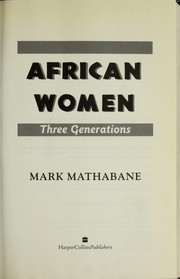Check nearby libraries
Buy this book

In African Women, the author of the highly acclaimed and best-selling memoir Kaffir Boy tells the deeply moving, often shocking, but ultimately inspiring stories of his grandmother, mother, and sister.
Coping with abuse, gambling, drunkenness, and infidelity from the men they love or have been forced to marry, all three women defy African tradition, and the poverty and violence of life in a modern urban society, to make fulfilling lives for themselves and those they love in the belly of the apartheid beast in South Africa.
Granny is sold to her future husband in their homeland - he pays the traditional bride price, lobola, agreed upon by their two families - and after fathering her three children, he deserts her for another woman. When Granny's daughter Geli comes of age, it's not surprising that Granny forces her to marry an older man, Jackson Mathabane, who might be less likely to desert a young wife.
The marriage of Geli and Jackson is fraught with drama from the very beginning. Geli and her still-to-be-born first child (the author) are almost victims of witchcraft, saved at the last moment by a relative who discovers the perpetrator and rescues both mother and child.
Jackson drinks and gambles, takes a mistress, beats his wife, and when Geli flees with the children to her aunt's house, demands all of them - his property - back with righteous indignation and the weight of African tribal tradition on his side.
Mathabane's sister Florah is swept up in the student rebellion against apartheid in the mid-1970s, which left hundreds of young blacks dead. Much later, a single mother looking for love and protection in the dangerous world of Alexandra, a black ghetto of Johannesburg, Florah falls in love with a notorious gangster who proves to be more than she can handle.
The stories of Florah, Geli, and Granny are told in their own words in alternating chapters that demonstrate how similar are the problems faced by each generation: all three women discover the need for an independent income in order to care for themselves and for their children; all three are the victims of the traditional assumption that women are property, commodities bought and sold by men; all three suffer from the terrible hardship imposed not only on women but also on black men by the system of apartheid in South Africa.
Check nearby libraries
Buy this book

Previews available in: English
| Edition | Availability |
|---|---|
|
1
African Women: Three Generations
February 1995, Perennial
Paperback
in English
0060925833 9780060925833
|
zzzz
|
| 2 |
zzzz
|
| 3 |
aaaa
|
Book Details
Edition Notes
Includes index.
Classifications
The Physical Object
ID Numbers
Source records
Scriblio MARC recordIthaca College Library MARC record
Library of Congress MARC record
Internet Archive item record
marc_openlibraries_phillipsacademy MARC record
marc_openlibraries_sanfranciscopubliclibrary MARC record
Marygrove College MARC record
Internet Archive item record
Library of Congress MARC record
Better World Books record
marc_columbia MARC record
Community Reviews (0)
Feedback?History
- Created April 1, 2008
- 15 revisions
Wikipedia citation
×CloseCopy and paste this code into your Wikipedia page. Need help?
| July 25, 2024 | Edited by MARC Bot | import existing book |
| February 28, 2022 | Edited by ImportBot | import existing book |
| November 17, 2020 | Edited by MARC Bot | import existing book |
| February 15, 2020 | Edited by ImportBot | import existing book |
| April 1, 2008 | Created by an anonymous user | Imported from Scriblio MARC record |









